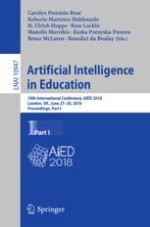2018 | OriginalPaper | Chapter
Better Late Than Never but Never Late Is Better: Towards Reducing the Answer Response Time to Questions in an Online Learning Community
Authors : Oluwabukola Mayowa (Ishola) Idowu, Gordon McCalla
Published in: Artificial Intelligence in Education
Publisher: Springer International Publishing
Activate our intelligent search to find suitable subject content or patents.
Select sections of text to find matching patents with Artificial Intelligence. powered by
Select sections of text to find additional relevant content using AI-assisted search. powered by
